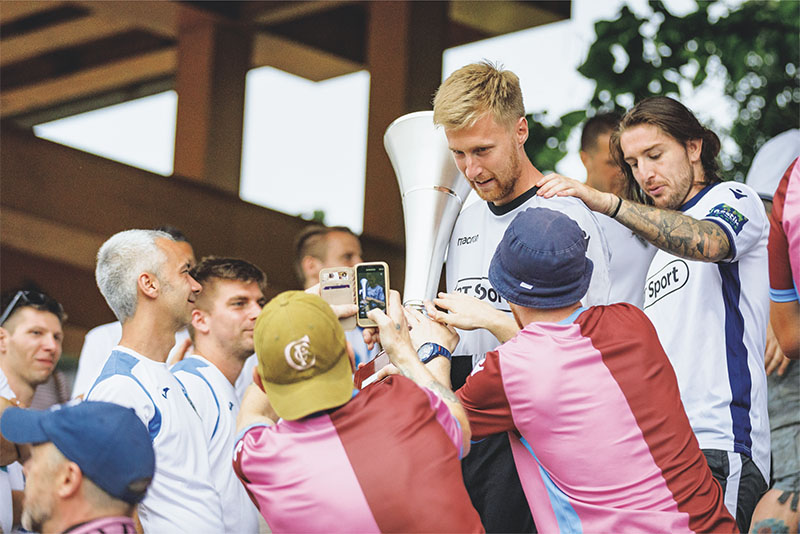
In the game’s early days, the famous sides Corinthians and Casuals toured in Hungary – more than a century on, their composite club returned for a taste of European glory
17 July ~ In the sweltering haze of a June heatwave in Budapest, a group of south-west Londoners, dressed mainly in pink, stood on the crumbling terrace of the Szonyi uti Stadion in the leafy Zuglo district and serenaded the 300-strong crowd with a rousing medley of songs about their team.
Corinthian-Casuals – two amateur teams merged to form the composite club in 1939 – had not set foot in Budapest for 115 years, but the return of England’s highest-ranked amateurs had earned them several pages of press coverage in Hungary. The Isthmian Premier League club were in town for the inaugural Egri Erbstein Tournament for the Corinthian Cup, and almost 100 of their most vocal supporters had followed them here, thrilled by the prospect of seeing their team playing in Europe.
The competition is a new international tournament for amateur teams and takes its name from Erno Egri Erbstein, the manager of the famous Torino side that dominated Italian football in the immediate post-war era, winning five consecutive titles before perishing in the Superga air disaster of May 1949. Egri Erbstein was not just a pioneering coach but also a Holocaust survivor, who had achieved his unprecedented success after returning to Italy to take up the job he had initially been forced to flee due to the passing of Benito Mussolini’s race laws in 1938.
Now his achievements are being celebrated in the country of his birth thanks to a group of football enthusiasts in Budapest who, inspired by Egri Erbstein’s story, decided to re-establish the first football club he represented as a player.
Budapesti Atletikai Klub, or BAK, initially folded in the 1940s, but had once been cup finalists and a top-three team. They joined the sixth tier of Hungarian football last summer and their nostalgic president, Bertalan Molnar, made it the club’s primary objective to mark the 70th anniversary of the Superga air disaster with a post-season tournament in Egri Erbstein’s name.
Molnar was keen to find a like-minded English club with which to form some kind of friendship and Corinthian-Casuals fitted that bill. After all, both Corinthians and Casuals had visited Budapest in the early stages of the game’s development in Hungary and their performances made a big impression. In fact, upon returning to London after their tour in 1904, the Corinthians minted a solid silver trophy, the Corinthian Cup, for the amateur teams of Hungary, which was presented by the Casuals during their own trip to Budapest the following year.
Money was raised to travel to Budapest through a GoFundMe campaign that drew contributions from supporters, members and local well-wishers. One former player, John Balson, donated £6,000 shortly before he passed away, stating that he wished for the current team to experience the kind of overseas tours he had enjoyed so much in his playing days.
In mid-June the Casuals took to the field to a great ovation for the first game against BAK. Despite a cagey opening in the energy-sapping midday sun, the visitors ran out 3-0 winners to set up a final against fourth-tier club Testveriseg (Brotherhood) the following afternoon.
The final, which was officiated by 2011 Champions League final referee Viktor Kassai, was of an altogether much higher standard than the semis. Both teams looked physically fit and played a neat passing game, making for a tense affair that remained goalless until the 91st minute, when Harry Ottaway rounded off a fine Corinthian-Casuals counterattack to win the game and the tournament. The opposition players collapsed in despair as the Casuals players leapt onto the goalscorer in front of the jubilant travelling support.
Egri Erbstein’s daughters, Susanna and Marta, and his grandson Stefano were at the centre of the trophy presentation ceremony, along with the British ambassador to Hungary, Iain Lindsay. And so the Corinthian-Casuals, whose predecessors had brought a trophy to Budapest more than a century previously, this time left the Hungarian capital with a piece of silverware tucked under their arms.
It was a new and unique event – “surreal”, as one local journalist put it – but as one of the organisers of the tournament, my hope is that it will prove to be the first edition of a new international competition for amateur football clubs. If the emotions of those fans who had travelled 1,000 miles from south-west London are anything to go by, we might just have something special on our hands. Dominic Bliss
Photo by Stuart Tree
This article first appeared in WSC 389, August 2019. Subscribers get free access to the complete WSC digital archive – you can find out more here
